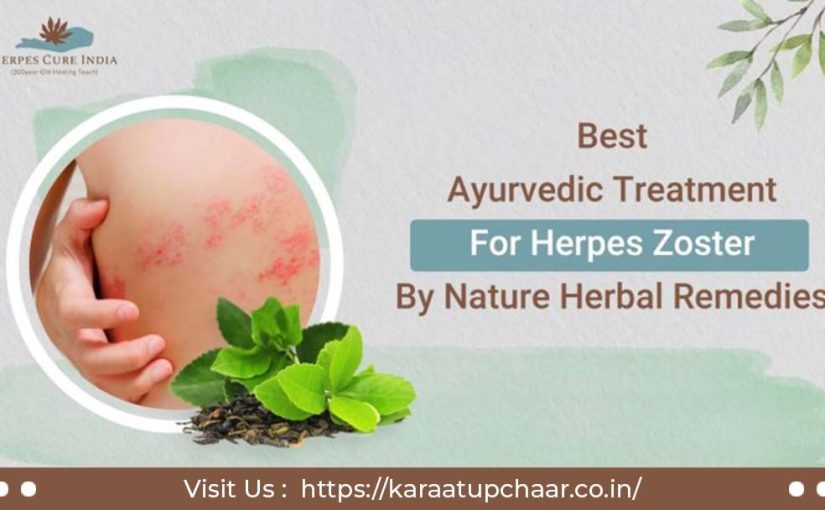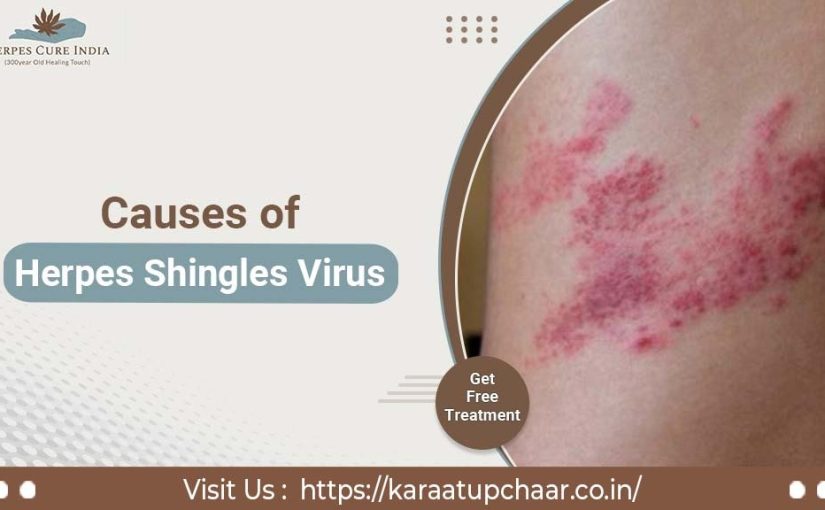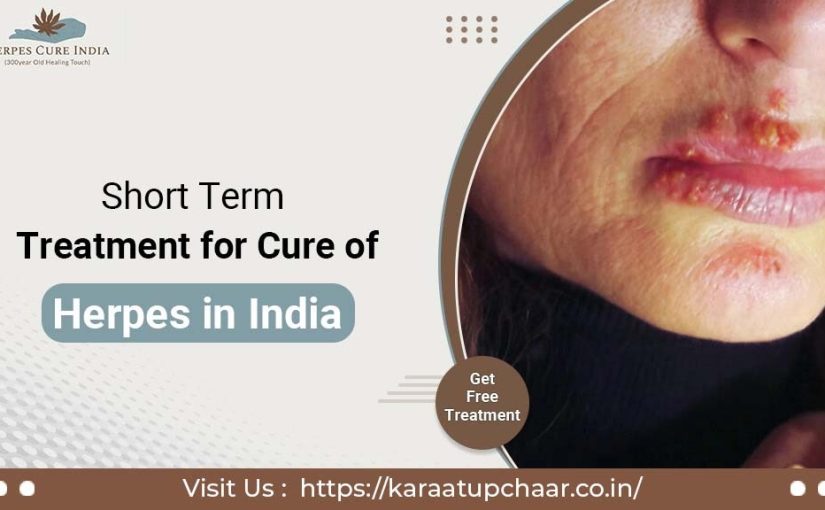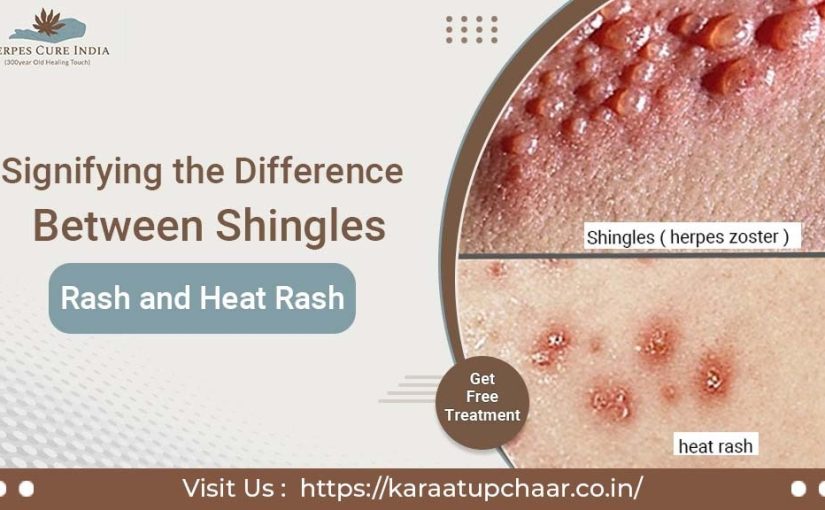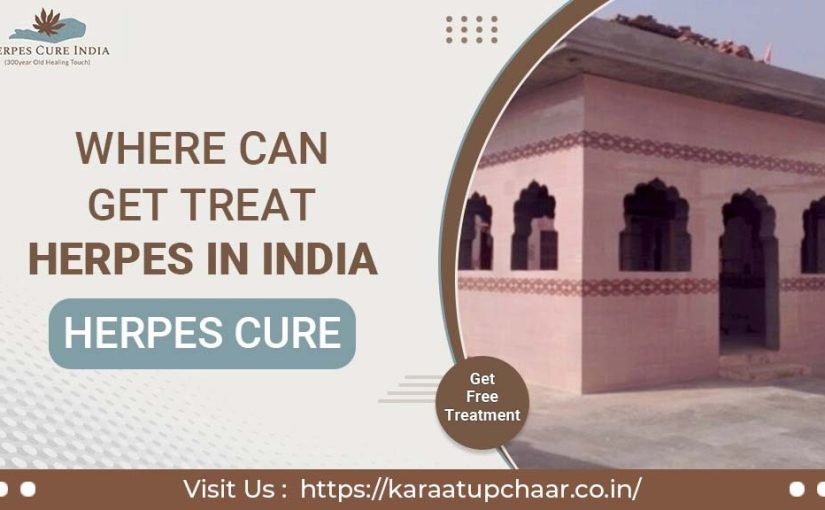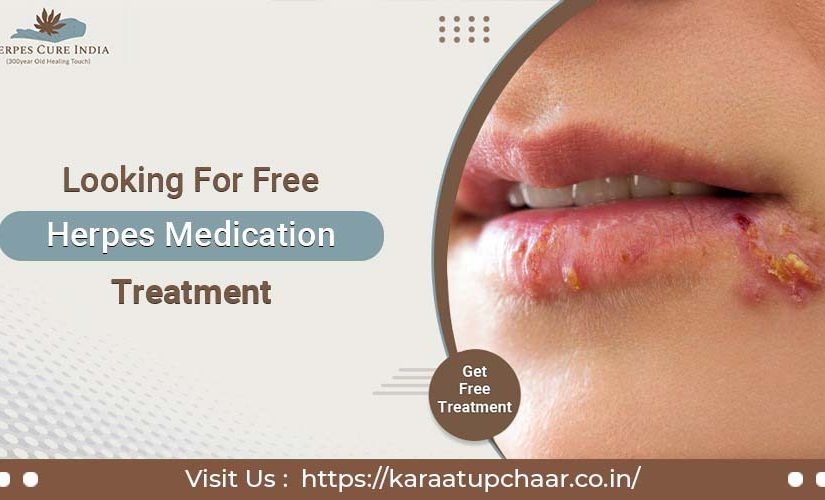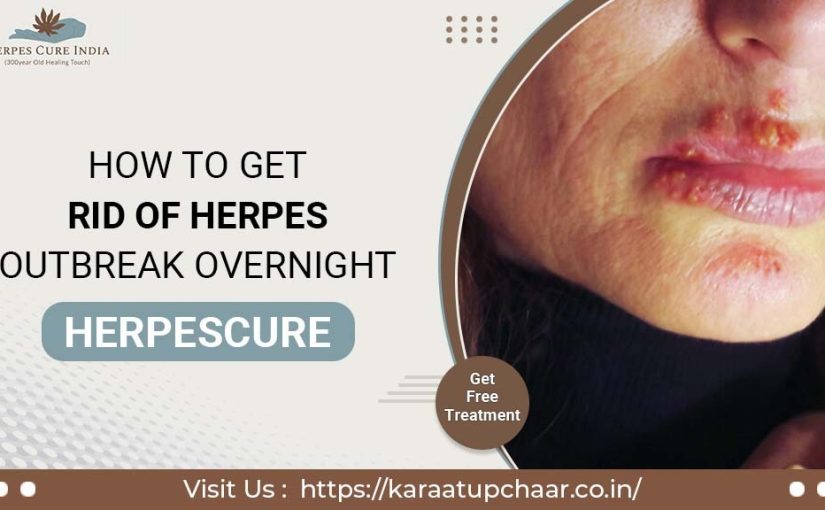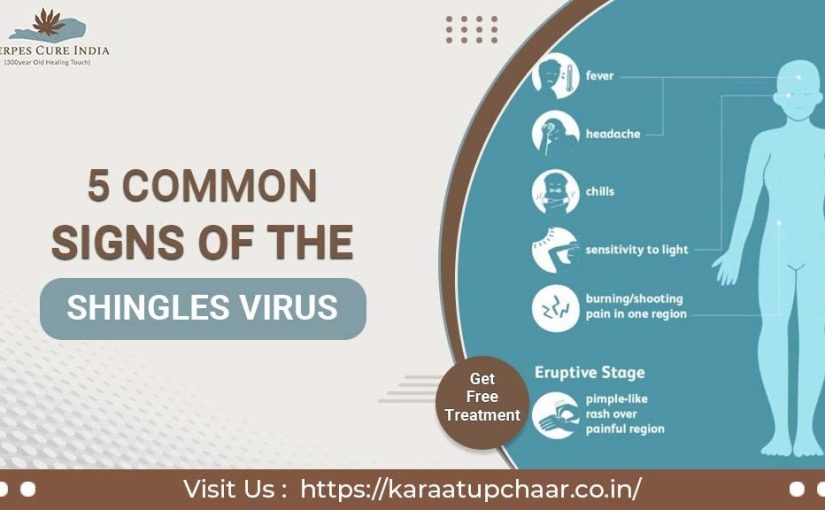
If you are looking for the best Ayurvedic treatment for herpes zoster, you have come to the right place. Herpes zoster, We are Offering free Ayurvedic Herble Oils, and cream. That is homemade from Ayurvedic medicines using the traditional Ayurveda method to treat herpes. Commonly known as shingles, is a viral infection that causes a painful rash. It is caused by the same virus that causes chickenpox. The virus remains dormant in the body’s nerve tissues after a person has had chickenpox and can reactivate later in life.
Herpes zoster is a viral infection caused by the same virus that causes chickenpox. After recovering from chickenpox, the virus remains dormant in the nervous system and can reactivate years later, causing Herpes Shingles. The condition is characterized by painful rashes and blisters that can last for weeks or even months.
Ayurveda, the ancient Indian system of medicine, offers a holistic approach to healing that focuses on balancing the body, mind, and spirit. Our Free Ayurvedic Herpes Treatments in India are safe, and effective, and can help alleviate symptoms, boost immunity, and promote overall well-being.
So, let’s dive into the Best Ayurvedic Treatment For Herpes Zoster.
CAUSES OF HERPES ZOSTER
Before we delve into the Best Ayurvedic Treatment For Herpes Zoster, let’s first understand the causes of this condition. As mentioned earlier, Herpes Zoster is caused by the same virus that causes chickenpox, the varicella-zoster virus. After recovering from chickenpox, the virus remains dormant in the nervous system and can reactivate later in life, causing Herpes Zoster.
Factors that can trigger the reactivation of the virus include stress, weakened immunity, aging, and certain medications.
Symptoms of Herpes Zoster
The symptoms of Herpes Zoster can vary from person to person but typically include:
- Painful rashes and blisters on one side of the body
- Tingling or burning sensations
- Itching
- Fever
- Headache
- Fatigue
- Sensitivity to light
Best Ayurvedic Treatment For Herpes Zoster
Ayurveda offers a variety of herbs, therapies, and lifestyle changes that can effectively alleviate the symptoms of Herpes Zoster and promote overall well-being. Here are some of the Best Ayurvedic Herpes Treatment in India:
- Tulsi (Holy Basil): Tulsi is a potent antiviral and immunomodulatory herb that can help boost the immune system and fight the herpes zoster virus. You can consume tulsi leaves by boiling them in water or by making a tea.
- Neem (Indian Lilac): Neem has antiviral and anti-inflammatory properties that can help relieve the pain and itching associated with herpes zoster. You can apply neem oil on the affected area or make a paste with neem leaves and apply it on the rash.
- Aloe Vera: Aloe vera has antiviral and anti-inflammatory properties that can help soothe the skin and reduce the pain and inflammation associated with herpes zoster. You can apply aloe vera gel on the affected area or drink aloe vera juice to boost your immunity.
- Turmeric: Turmeric is a potent anti-inflammatory and antioxidant herb that can help reduce the inflammation and pain associated with herpes zoster. You can consume turmeric powder by mixing it with warm milk or water.
- Ashwagandha (Indian ginseng): Ashwagandha is a potent adaptogenic herb that can help boost your immunity and reduce stress. You can consume ashwagandha powder or extract in the form of capsules or tablets.
We always recommend taking a consult with our qualified Ayurvedic practitioner. Get a Free Herpes Cure in India, we offer a homemade Ayurvedic herbal oil. We manufacture Oils, a cream which is made from Ayurvedic medicines using the traditional Ayurveda method to treat Herpes.
Our Oil’s are free of charge, no cost, Services available all over India
Call Us At- 9954064243, 9435115363, or 9435015362.
Frequently Asked Questions (FAQ)
Q1: What is the Ayurvedic treatment for Herpes Zoster?
Ayurvedic treatment for Herpes Zoster includes a holistic approach that focuses on balancing the body, mind, and spirit. It includes the use of various herbs, therapies, and lifestyle changes to alleviate the symptoms of this condition and promote overall well-being.
Q2: Is Ayurvedic treatment safe for Herpes Zoster?
Yes, Ayurvedic treatment is generally safe for Herpes Zoster. Ayurvedic herbs and therapies are natural and have been used for centuries to treat various health conditions, including Herpes Zoster. However, it is always recommended to consult a qualified Ayurvedic practitioner before starting any treatment.
Q3: How long does Ayurvedic treatment take to show results for Herpes Zoster?
The duration of Ayurvedic treatment for Herpes Zoster depends on various factors, such as the severity of the condition, the individual’s overall health, and their adherence to the treatment plan. Generally, Ayurvedic treatments take time to show results as they focus on treating the root cause of the condition.
Q4: Can Ayurvedic treatment cure Herpes Zoster completely?
There is no known cure for Herpes Zoster, but Ayurvedic treatment can effectively alleviate the symptoms and prevent the recurrence of the condition. Ayurvedic herbs and therapies can boost immunity, reduce inflammation and pain, and promote overall well-being, which can help manage the symptoms of Herpes Zoster.
Frequently Asked Questions (FAQ) About Herpes
Can herpes be treated?
Yes, herpes can be treated, although it cannot be cured. Treatment focuses on managing symptoms, reducing the frequency of outbreaks, and lowering the risk of transmission. Antiviral medications, such as acyclovir, valacyclovir, and famciclovir, are commonly prescribed to help control the virus. These medications can speed up the healing of sores, reduce the severity and duration of symptoms, and decrease the likelihood of future outbreaks. Ayurvedic treatments for herpes include using herbs like neem, turmeric, and aloe vera to soothe the skin and boost immunity. Additionally, maintaining good hygiene, avoiding direct contact during outbreaks, and using condoms can help manage and prevent the spread of herpes. While treatment helps manage the condition, the virus remains in the body and can reactivate.
Are herpes common?
Yes, herpes is very common. The two main types, HSV-1 and HSV-2, are widespread globally. HSV-1, which typically causes oral herpes, affects about 67% of the world’s population under the age of 50, according to the World Health Organization. It often results in cold sores or fever blisters around the mouth.
HSV-2, which primarily causes genital herpes, affects around 11% of the global population aged 15-49. It is transmitted through sexual contact and results in sores in the genital or anal area.
Due to the high prevalence, many people may have herpes without experiencing noticeable symptoms, contributing to its widespread nature.
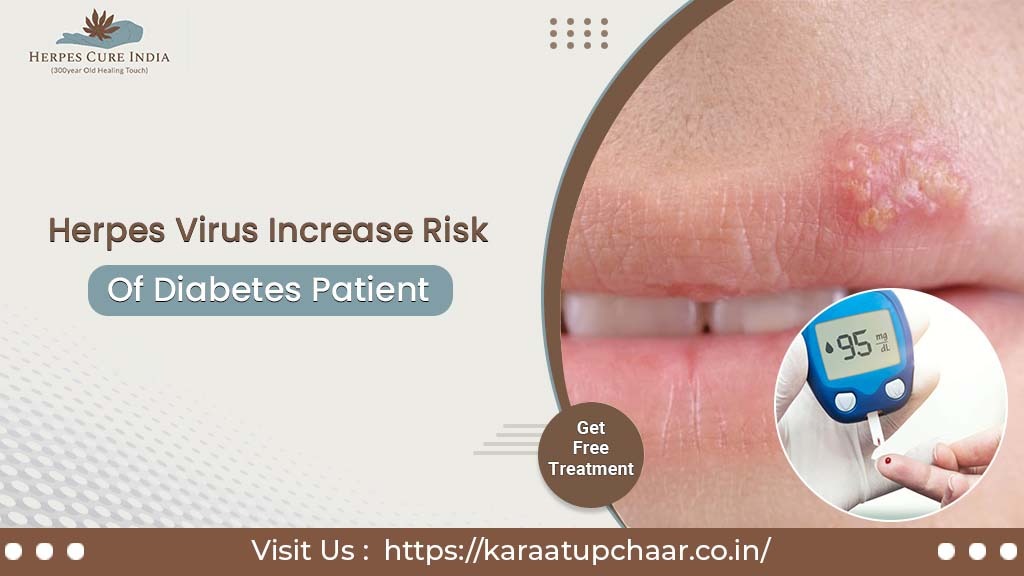
Herpes virus infection is caused by the reactivation of varicella-zoster (VZV) dormant in the sensory ganglia following primary infection. This is a painful blister or rash on the affected area as the virus travels along sensory nerve fibers. The annual incidence of herpes virus is similar in Asia Pacific, North America, and Europe at 3 to 5 cases per 1000 person-years (PY). The incidence of herpes viruses increases markedly with age and Immunosuppression, affecting more than 50% of people over the age of 85.
Diabetic patients are susceptible to herpes virus infection due to decreased cell-mediated immunity (CMI) during this process and the reactivation of the varicella-zoster virus. Diabetes mellitus (DM) is generally recognized as a prothrombotic disease associated with altered innate or adaptive immunity and endothelial dysfunction secondary to inflammation. Therefore, diabetes mellitus with chronic comorbidities or associated vascular complications is considered a major preventable risk factor for cardiovascular disease. Diabetic patients are two to four times more likely to develop cardiovascular or cerebrovascular disease than non-diabetic patients. Patients are at increased risk of developing the herpes virus if they have two or more comorbidities. On the other hand, herpes zoster was an independent risk factor for VZV vascular lesions such as stroke, transient ischemic attack, and myocardial infarction. However, few studies have examined the association between shingles risk and diabetes-related micro vascular disease in diabetic patients with coronary artery disease (CAD).
The aim of this study was to determine whether the risk of herpes zoster in diabetic patients increases with the co-occurrence of coronary artery disease or with other associated microvascular diseases. In addition, we assessed the effect of anti-diabetic drugs on the risk of herpes viruses in these patients using data from a national database in Taiwan.
HERPES TRIGGERS DIABETES PATIENTS
A common herpes virus can trigger diabetes in people with diabetes. People infected with herpes simplex virus type 1 (HSV-1) may have a 50% increased risk of developing type 2 diabetes. Previous research has shown that hepatitis C virus infection is a risk factor for type 2 diabetes. However, it is also possible that infection with other viruses can make people more susceptible to the disease.
The current study tested HSV-1 infection in 206 participants with type 2 diabetes and a control group of 1,360 participants without diabetes. All participants were negative for antibodies to the hepatitis C virus, the researchers found. The findings showed that 46 percent of the diabetic patients were infected with HSV-1, compared with 36 percent of the control group. In a Diabetes Care (February 2005) report, researchers showed that people with diabetes accounted for 16 percent of the HSV-1-infected population, but only 11 percent of them were free of the virus.
WHY DIABETES MAKES IT EASY TO CONTRACT HERPES
Most people with type 1 or type 2 diabetes have a weakened immune system, making it easier to get infections and thus harder to fight off. Because of this, people with diabetes are more susceptible to viral infections, including herpes simplex virus (HSV). HSV is one of the most common and easily contracted STDs, and people with diabetes can contract HSV if they are not careful with someone who is already infected.
Herpes and Type 1 Diabetes The herpes virus remains in the body’s nerve cells indefinitely, regardless of whether the person has frequent or infrequent attacks. While these can be triggered by lifestyle changes (eg, stress, menstruation), having a compromised immune system in diabetics puts them at constant risk of flare-ups.
How to Prevent Herpes in terms of Diabetic Patients?
The best protection against HSV in people with type 1 and type 2 diabetes is prevention. While a weakened immune system can make it easier to catch the virus, there are steps you can take to avoid it. The Centers for Disease Control and Prevention recommends avoiding specific contact with infected people as a best precaution, including:
• Have vaginal, anal, or oral
• Kiss
• Shared drinks or cutlery
If you have type 1 or 2 diabetes and are concerned about your risk of contracting the herpes virus, visit https://herpescure.in Healthcare professionals are available 365 days a year to educate you about the risks and testing for STDs. Stop by today!
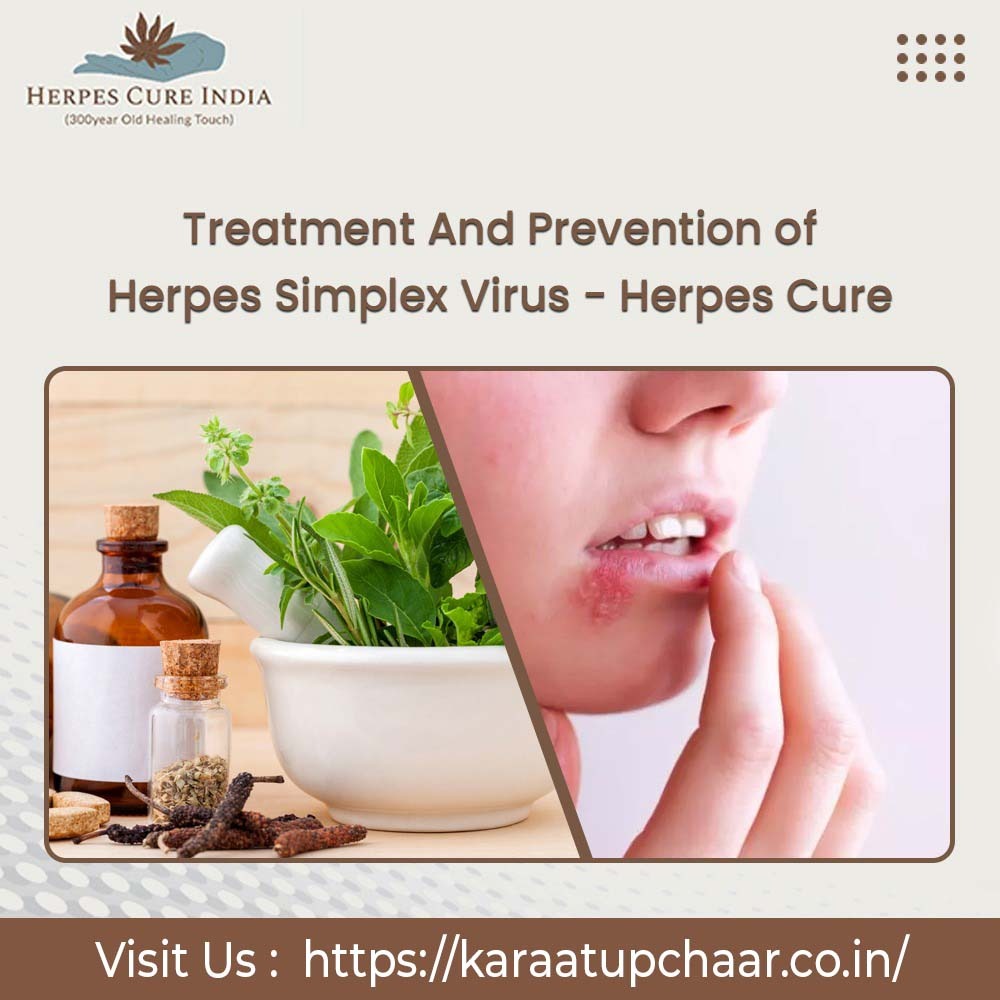
Cure for herpes simplex virus with herpes cure website. Herpes zoster sometimes referred to as shingles, is a common nerve illness brought on by a virus that presents as a painful blister rash anywhere on the body. Even after the rash has healed, the pain may linger for months. The virus is the same as the one that causes chickenpox. Throughout a person’s lifetime, the virus stays latent in the body and may reawaken years or even decades later to produce a zoster.
WHO IS AT RISK OF DEVELOPING HERPES SHINGLES?
It is more likely that someone who has had chickenpox would acquire shingles.
Due to compromised defenses (such as people with cancer, HIV, organ transplant recipients, or those receiving chemotherapy).
- Who is in distressed condition?
- Who has reached or is above the age of 50?
- People who are ill
- Who has experienced trauma?
Infected individuals will not develop symptoms until the chickenpox virus has completely replicated within their bodies. The virus stays put in the dorsal root ganglion of your spinal nerve. The vast majority of the population has no idea the virus even exists in their body. Stress is a common precipitating factor in herpes virus resurgence; Take a the best Ayurvedic Treatment for herpes cure, by nature herbal oils.
SYMPTOMS
Shingles are characterized by a red, itchy rash, as the name suggests. Shingles often affect just one side of the body or one side of the face at a time. Even if you haven’t seen any signs of the rash yet, itching, burning, or tingling in the areas where it will appear may irritate you.
The effects of the sickness on the nervous system might last months or even years. Long-term nerve soreness becomes more common as you get older. There have been reports of searing, throbbing, aching, or stinging nerve discomfort.
Shingles may cause conjunctivitis of the eyes.
One of the first signs of herpes simplex virus is:
- Fever
- Chill bumps
- Worn out.
- Sensitivity towards light
- I went to the doctor because I was experiencing stomach pains.
- The skin might itch or feel like it’s burning in one area alone.
- The skin may have a little, raised rash;
- The affected area of the skin will be darkened
- Fluid-filled sores that eventually scab over.
PREVENTION IS BETTER THAN CURE. GO FOR VACCINATION
You can cure for herpes simplex virus with a simple and effective vaccination. Getting vaccinated is the most effective way to reduce the chance of developing shingles or experiencing long-term pain if one does get shingles. Vaccination against zoster is recommended for all healthy adults 50 and older, as well as those 19 and older with compromised immunity owing to disease or treatment. Even if a person has already had chickenpox, the infection might recur. Those who have already had chickenpox are still able to get a vaccine to prevent future outbreaks. Although there is no specific time restriction for receiving the varicella vaccination after having chickenpox, you should often wait until the outbreak has subsided before receiving the vaccine. The vaccination regimen should be discussed with a medical professional.
Frequently Asked Questions (FAQ) About Herpes
Can herpes go away?
Herpes, caused by the herpes simplex virus (HSV), does not go away permanently because the virus remains in the body for life. After the initial infection, the virus stays dormant in nerve cells and can reactivate, causing recurrent outbreaks. These outbreaks might decrease in frequency and severity over time. Antiviral medications can help manage symptoms and reduce the frequency of outbreaks but do not eradicate the virus. While herpes cannot be completely cured or eliminated from the body, many people experience long periods without symptoms and can manage the condition effectively.

Best Ayurvedic Treatment For Herpes Zoster By Nature Herbal Remedies
If you are looking for the best Ayurvedic treatment for herpes zoster, you have come to the right place. Herpes zoster, commonly known as herpes shingles, is a viral infection that causes a painful rash. It is caused by the same virus that causes chickenpox. The virus remains dormant in the body’s nerve tissues after a person has had chickenpox and can reactivate later in life. We are offering free Ayurvedic herbal oils and cream, which are homemade from best Ayurvedic medicines for herpes using the traditional Ayurveda method to treat herpes.
Causes of Herpes Zoster
Before we delve into the best Ayurvedic treatment for herpes zoster, let’s first understand the causes of this condition. Herpes Zoster is caused by the varicella-zoster virus, the same virus that causes chickenpox. After recovering from chickenpox, the virus remains dormant in the nervous system and can reactivate later in life, causing Herpes Zoster. Factors that can trigger the reactivation of the virus include stress, weakened immunity, aging, and certain medications.
Symptoms of Herpes Zoster
The symptoms of Herpes Zoster can vary from person to person but typically include:
- Painful rashes and blisters on one side of the body
- Tingling or burning sensations
- Itching
- Fever
- Headache
- Fatigue
- Sensitivity to light
Best Ayurvedic Treatment for Herpes Zoster
Ayurveda offers a variety of herbs, therapies, and lifestyle changes that can effectively alleviate the symptoms of Herpes Zoster and promote overall well-being. Here are some of the best Ayurvedic treatments for herpes in India:
Tulsi (Holy Basil): Tulsi is a potent antiviral and immunomodulatory herb that can help boost the immune system and fight the herpes zoster virus. You can consume tulsi leaves by boiling them in water or by making a tea.
Neem (Indian Lilac): Neem has antiviral and anti-inflammatory properties that can help relieve the pain and itching associated with herpes zoster. You can apply neem oil on the affected area or make a paste with neem leaves and apply it to the rash.
Aloe Vera: Aloe vera has antiviral and anti-inflammatory properties that can help soothe the skin and reduce the pain and inflammation associated with herpes zoster. You can apply aloe vera gel on the affected area or drink aloe vera juice to boost your immunity.
Turmeric: Turmeric is a potent anti-inflammatory and antioxidant herb that can help reduce the inflammation and pain associated with herpes zoster. You can consume turmeric powder by mixing it with warm milk or water.
Ashwagandha (Indian ginseng): Ashwagandha is a potent adaptogenic herb that can help boost your immunity and reduce stress. You can consume ashwagandha powder or extract in the form of capsules or tablets.
We always recommend consulting with our qualified Ayurvedic practitioner. Get a free herpes cure in India; we offer a homemade Ayurvedic herbal oil. We manufacture oils and creams made from best Ayurvedic medicines for herpes using the traditional Ayurveda method to treat herpes.
Our oils are free of charge, with no cost, and services are available all over India.
Call Us At- 9954064243, 9435115363, or 9435015362.
Frequently Asked Questions (FAQ) about Ayurvedic Treatment for Herpes
Q1: What is the Ayurvedic treatment for Herpes Zoster?
Ayurvedic treatment for Herpes Zoster includes a holistic approach that focuses on balancing the body, mind, and spirit. It includes the use of various herbs, therapies, and lifestyle changes to alleviate the symptoms of this condition and promote overall well-being.
Q2: Is Ayurvedic treatment safe for Herpes Zoster?
Yes, Ayurvedic treatment is generally safe for Herpes Zoster. Ayurvedic herbs and therapies are natural and have been used for centuries to treat various health conditions, including Herpes Zoster. However, it is always recommended to consult a qualified Ayurvedic practitioner before starting any treatment.
Q3: How long does Ayurvedic treatment take to show results for Herpes Zoster?
The duration of Ayurvedic treatment for Herpes Zoster depends on various factors, such as the severity of the condition, the individual’s overall health, and their adherence to the treatment plan. Generally, Ayurvedic treatments take time to show results as they focus on treating the root cause of the condition.
Q4: Can Ayurvedic treatment cure Herpes Zoster completely?
There is no known cure for Herpes Zoster, but Ayurvedic treatment can effectively alleviate the symptoms and prevent the recurrence of the condition. Ayurvedic herbs and therapies can boost immunity, reduce inflammation and pain, and promote overall well-being, which can help manage the symptoms of Herpes Zoster.
Frequently Asked Questions (FAQ) About Herpes
Can herpes be treated?
Yes, herpes can be treated, although it cannot be cured. Treatment focuses on managing symptoms, reducing the frequency of outbreaks, and lowering the risk of transmission. Antiviral medications, such as acyclovir, valacyclovir, and famciclovir, are commonly prescribed to help control the virus. These medications can speed up the healing of sores, reduce the severity and duration of symptoms, and decrease the likelihood of future outbreaks. Ayurvedic treatments for herpes include using herbs like neem, turmeric, and aloe vera to soothe the skin and boost immunity. Additionally, maintaining good hygiene, avoiding direct contact during outbreaks, and using condoms can help manage and prevent the spread of herpes. While treatment helps manage the condition, the virus remains in the body and can reactivate.
Are herpes common?
Yes, herpes is very common. The two main types, HSV-1 and HSV-2, are widespread globally. HSV-1, which typically causes oral herpes, affects about 67% of the world’s population under the age of 50, according to the World Health Organization. It often results in cold sores or fever blisters around the mouth.
HSV-2, which primarily causes genital herpes, affects around 11% of the global population aged 15-49. It is transmitted through sexual contact and results in sores in the genital or anal area.
Due to the high prevalence, many people may have herpes without experiencing noticeable symptoms, contributing to its widespread nature.

Causes of Herpes Shingles Virus
The two types of herpes simplex virus (HSV) are HSV-1 and HSV-2. Although HSV-1 may also cause genital herpes, it is more often transmitted via direct oral contact, resulting in oral herpes (characterized by cold sore symptoms). Genital herpes, on the other hand, is an STD caused by herpes simplex virus type 2 (HSV-2).
According to the World Health Organization (WHO):
More than two-thirds (67%) of the world’s population under the age of 50, approximately 3.7 billion people, have HSV-1 infection.
An estimated 491 million people worldwide, or 13%, aged 15–49 are infected with HSV-2.
Herpes symptoms include painful blisters or ulcers that may recur over time. However, the vast majority of HSV infections cause no noticeable signs or symptoms. People with HSV-2 infection are at higher risk of acquiring and transmitting HIV.
What are the Causes of Herpes?
Herpes is caused when one of the herpes simplex virus enters the body through a cut or scrape and moves through the nerves. When this virus becomes active, it may cause sores to appear on the skin.
Herpes viruses can spread through contact with open wounds or cuts in the skin, or by entering the body through the mouth, vagina, penis, or anus.
Cold sores are a common symptom of herpes simplex virus type 1 (HSV-1) infections, which often affect the mouth and lips. Type 1 herpes may be spread through various means, including:
- Intimate actions
- Kissing and oral sex
- Cuddling
- Sharing objects with an infected person (e.g., towels, toothbrushes, or food)
Blisters caused by herpes simplex virus 2 (HSV-2) may appear anywhere on the body, including the mouth, genitalia (vagina, vulva, cervix), penis, scrotum, buttocks, and anus. Sexual contact is the primary transmission route for herpes type 2, including:
- Intercourse
- Oral sex
- Anal sex
- Sexual contact with a person who is herpes-positive
- Exposure to contaminated sperm or cervical secretions
- Asymptomatic Infectious Individuals
Even though herpes is most contagious when open sores, or ulcers, are present, it can still spread even when there are no visible sores, a condition known as asymptomatic shedding. In other words, the virus can spread even if there are no visible signs of it.
Herpes is always contagious, even in the absence of symptoms, because there is no way to know if the virus is shedding without symptoms. Reinfection is a risk if someone touches a sore and then scratches or rubs another area of skin on their body.
Women infected with HSV-2 may transmit the virus to their infants during vaginal birth, with the risk being higher if the mother recently contracted the virus.
Ways Through Which the Dormant Virus Gets Triggered
Many people who are infected with the herpes virus at an early stage, or who are asymptomatic, have a high chance of the virus remaining latent for long periods. A herpes outbreak can be triggered by any of the following causes of herpes:
- An infection, disease, injury, or physical stress
- Persistent emotional stress or distress lasting more than a week
- General illness (ranging from mild illnesses to serious conditions)
- Immunosuppression as a result of conditions such as AIDS
- Use of medications like chemotherapy or steroids
- Fatigue
- Sexual activity or trauma to the affected area
- Menstruation
What are the causes of Herpes Outbreak?
The HSV virus initiates the process of viral replication after entering the nucleus of an infected human cell. Even if your cells have been infected, it is quite unlikely that you will have any symptoms at this stage.
During the first stage of infection, the virus travels through nerve cells to areas known as ganglia, which are nerve-branching regions. The virus will remain dormant at this site, neither reproducing nor showing any signs of its existence during this time.
Sometimes, the dormant virus becomes active again (due to the causes of herpes mentioned above), restarting the replication process. When this happens, the virus travels back to the surface of the skin via the nerve, leading to the death of many infected skin cells. This results in blistering, and when these blisters break open, they turn into sores or ulcers known as cold sores or genital herpes.
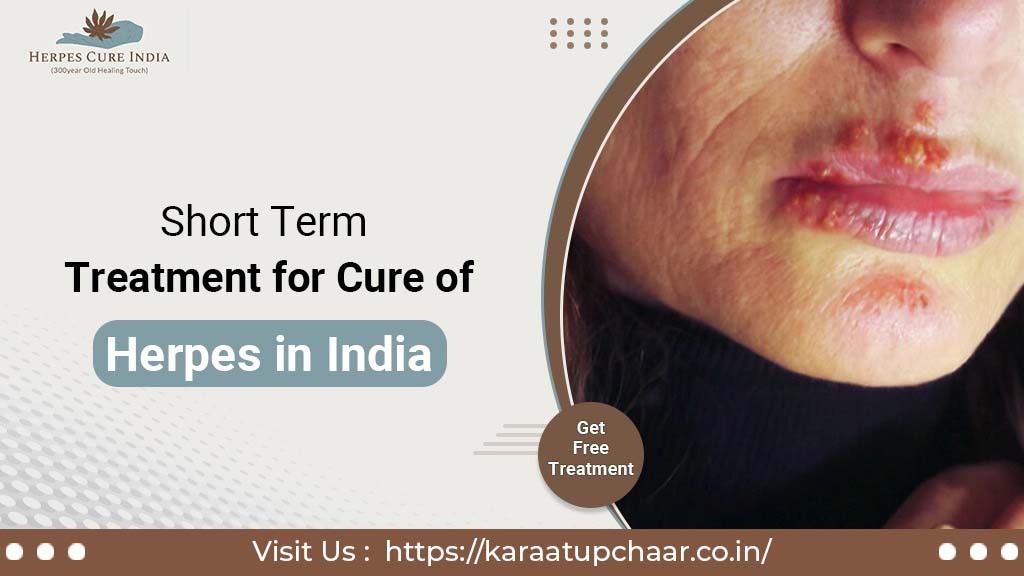
Short Term Treatment for Herpes in India
Herpes is a frequent and contagious infection caused by the herpes simplex virus (HSV). Spread through skin-to-skin contact with infected areas, it often manifests as sores or blisters around the mouth and/or external genitalia. Other symptoms of herpes can include itching, fever, chills, body aches, and painful or difficult urination. In India, the approach to a herpes cure often emphasizes home remedies over medication. These remedies provide short term treatment for herpes in India, offering effective relief for patients. We also provide free herpes treatment in India.
What’s the Best Short Term Treatment for Herpes in India?
Even though there is no permanent cure for herpes, there are numerous methods to manage the symptoms and control the infection. In India, we offer an amazing oil-based treatment for herpes, which makes outbreaks go away faster and prevents them from returning as frequently.
What Do Doctors Say About Short Term Treatment for Herpes in India?
If you’re experiencing an outbreak, your doctor will inform you of the best treatment options for your condition and may provide medication to help heal your sores faster. You can also ease the pain by:
- Taking a warm bath
- Keeping your genital area dry (as moisture prolongs the sores)
- Wearing soft, loose clothing
- Applying an ice pack
- Taking a pain reliever like aspirin
How Can I Get Short Term Treatment for Herpes in India?
If you experience frequent herpes outbreaks, your doctor may recommend taking medication daily—this is known as suppressive therapy. It helps prevent future outbreaks and reduces the likelihood of transmitting herpes to your partners. However, in India, many people prefer home remedies over medication, as the short term treatment for herpes often focuses on natural and holistic approaches.
Whether or not you take herpes medication treatment, it’s important to take care of yourself by eating healthy foods, getting enough sleep, and avoiding stress, which can trigger herpes outbreaks. In India, it is widely believed that home remedies provide effective relief without the need for medication.
How to Prevent Herpes Outbreaks
Other infections, surgery, sexual activity, menstruation, and skin irritations can all trigger a herpes outbreak. Sunburn, injuries to your lips, or other diseases can also cause flare-ups. It’s important to avoid getting sunburned if you have oral herpes.
Herpes outbreaks typically become less frequent and less severe over time, whether or not they are treated. In India, many people find that safe, gentle, and efficient home remedies provide short term treatment for herpes without the adverse effects or drug dependence associated with medication.
Since cold sores and genital herpes are caused by the same virus, physical symptoms such as blisters may appear around the mouth as well as the genitals. Anyone engaging in sexual intercourse with someone known to have herpes should get tested immediately, even if they show no symptoms, due to the nature of the virus. Home remedies can help reduce inflammation, swelling, and itching while waiting for antiviral treatments to take effect.
What are the common Short Term Treatment for Herpes in India?
Several medications are used to treat herpes, all of which are antivirals, such as valacyclovir (Valtrex®), acyclovir (Zovirax®), and famciclovir (Famvir®). However, these medications are often heavy and not always preferred. If you want to treat herpes without medication, visit the Herpes Cure India website, where you can receive free treatment. They prepare herbal oils at home, providing relief from herpes within 3 days.
What is the Latest Short Term Treatment for Herpes in India?
Home remedies are currently the latest approach to treating herpes in India. Although medication is available, it is often avoided due to its strength. Some therapists working with Herpes Cure India provide home remedies, including specially prepared oils that offer relief within 3 days. If you’re seeking free herpes treatment without medication, visit their website for more details.
How Far Away is a Cure for Herpes in India?
Herpes is currently incurable, and it takes time to relieve symptoms. However, by consulting a doctor, you can obtain antiviral medication to reduce the severity of symptoms within a few days. Starting treatment within 24 hours of symptom onset is crucial.
Can Herpes Be Cured in the Future?
Yes, a cure for herpes simplex may be possible in the future. If you receive treatment from Herpes Cure India, you can expect relief within 3 days. Antiviral medications such as acyclovir, famciclovir, and valacyclovir help reduce the severity and frequency of symptoms but cannot cure the infection.
What is the Main Cause of Herpes in India?
You can contract genital herpes after being exposed to HSV-1 or HSV-2. Most people acquire genital herpes from HSV-2 during sexual intercourse. HSV-1, which causes cold sores, can also spread to the genitals through oral sex.
If you want to receive free herpes treatment from us, please visit our website or contact us:
Call Us:
Trinagar Kamal Agarwal (Hargovind Chahcha) – 9013289821
FD 46, Pitampura Prachi Agarwal – 9811718621
Ramprastha, Vaishali, Noida Ravi Agarwal – 9911395464
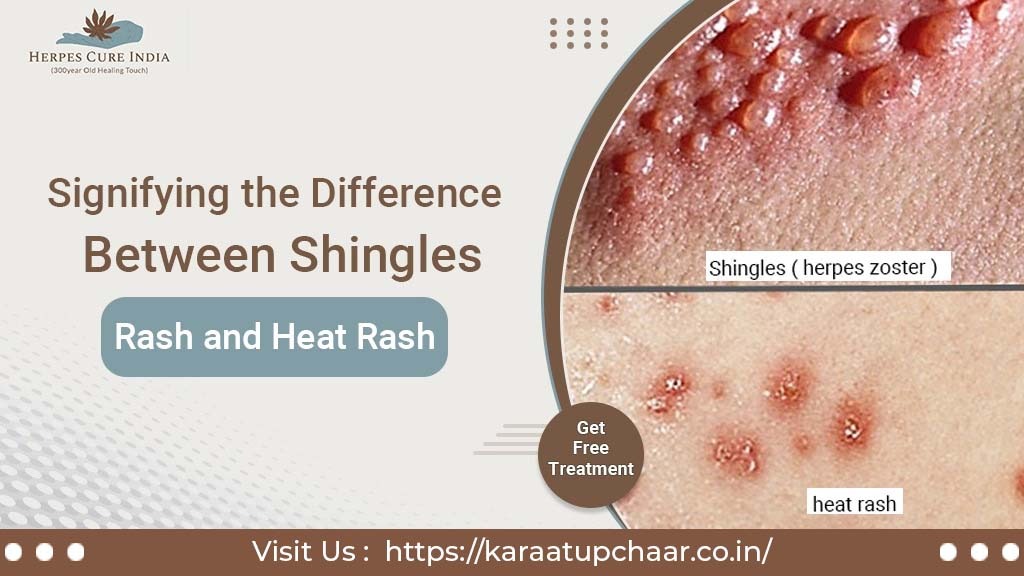
Understanding the Difference between Shingles Rash & Heat Rash
Shingles rash and heat rash are entirely different conditions, but they are often confused with one another. This confusion can lead to delays in diagnosing and treating shingles, allowing the herpes virus to spread further in the body. By the time people realize they are dealing with herpes shingles, it might be too late to prevent complications.
In this blog, we will discuss the difference between Shingles Rash & Heat Rash. But first, let’s clarify what herpes shingles, also known as herpes zoster, is.
What is Herpes Shingles? Understanding the Causes before Exploring the Difference between Shingles Rash & Heat Rash
Herpes infections are caused by the herpes simplex virus (HSV). This infection typically results in blisters or sores around the genitals or mouth, along with other symptoms. There are two types of HSV:
- HSV-1: Causes oral herpes, affecting the skin around the mouth.
- HSV-2: Causes genital herpes and is primarily spread through sexual contact.
Rashes, in general, can be concerning, especially in older adults or community settings where undiagnosed rashes might raise alarms about serious conditions like shingles. It’s important to know the difference between Shingles Rash & Heat Rash to avoid confusion and ensure proper treatment.
Symptoms of Shingles Rash vs. Heat Rash: How to Recognize the Difference
| Shingles Rash | Heat Rash |
| Painful red skin rash with blisters in a localized area, which become cloudy or darkened as they fill with fluid. | Heat rash, also known as prickly heat or miliaria, affects both adults and babies, particularly in hot, humid conditions. |
| Typically occurs as a single, wide stripe on either the left or right side of the body or face. | Heat rash occurs when sweat is trapped under the skin, causing small, blister-like bumps and itching or prickling sensations in the affected area. |
| Two to four days before the rash appears, there may be tingling or localized pain. | Two to four days before the rash appears, there may be itching in the area. |
| Some people develop ongoing nerve pain, lasting months or years, known as Postherpetic Neuralgia (PHN). | Heat rash usually resolves once the skin cools down. Severe cases may require treatment from a healthcare provider. |
Clarifying the Difference between Shingles Rash & Heat Rash
Self-diagnosing a skin condition or making assumptions about a loved one’s health can lead to serious consequences. When dealing with rashes in older adults, it’s easy to confuse the symptoms with other viral diseases like shingles. Understanding the difference between Shingles Rash & Heat Rash is crucial to avoid misdiagnosis.
Recognizing Shingles: The Key to Identifying the Difference between Shingles Rash & Heat Rash
Shingles is a viral infection that can spread from person to person during its vesicular stage. It reactivates in nerve tissue, particularly in individuals at risk, such as those with a latent chickenpox virus or those who have never had chickenpox or the vaccine. Shingles is more common in immunocompromised individuals and people over 65.
The “brand” or “belt” of shingles is the most recognizable sign of an active infection and a critical factor in distinguishing it from heat rash. Shingles usually appear around the waist or chest, creating a girdle-like rash that covers only one side of the midsection.
If you suspect shingles, isolate yourself to prevent spreading the virus and see a doctor for a physical examination. Healthcare providers can quickly identify shingles due to the distinctive blistering rash and will prescribe antiviral medications and recommend home remedies to speed up recovery and reduce pain.
Home Remedies to Help Identify and Treat Shingles Rash & Heat Rash
Herpes Cure offers home remedies specifically for herpes patients, providing free herpes treatment in India that can bring relief in just three days. No heavy medication or vaccination is required—just natural oils that deliver effective results.
Our Medical Expert Board, composed of certified doctors, reviews and vets all information to ensure you are well-informed and confident in your health decisions. We provide free herpes treatment options and empower you with solutions to your most pressing questions, from understanding herpes to managing new diagnoses.
How to Identify Shingles
Shingles is a painful rash that develops on one side of the face or body. The rash consists of blisters that typically scab over in 7 to 10 days and clear up within 2 to 4 weeks. Before the rash appears, people often experience pain, itching, or tingling in the affected area.
Recognizing the Early Signs to Differentiate the Difference between Shingles Rash & Heat Rash
Shingles typically appear as a single stripe of blisters that wraps around the left or right side of the torso. This condition is caused by the varicella-zoster virus—the same virus that causes chickenpox. After you have had chickenpox, the virus remains in your body for life, potentially reactivating as shingles.
What Triggers a Shingles Outbreak?
Shingles occurs when the varicella-zoster virus reactivates in the body after lying dormant. It cannot be contracted from another person who has shingles. Understanding the triggers that lead to an outbreak can help distinguish between shingles and heat rash.
Where Does the Shingles Rash Usually Appear?
The shingles rash typically develops as a stripe of blisters that wraps around either the left or right side of the torso. Sometimes, the shingles rash appears around one eye or on one side of the neck or face, helping to differentiate it from heat rash.
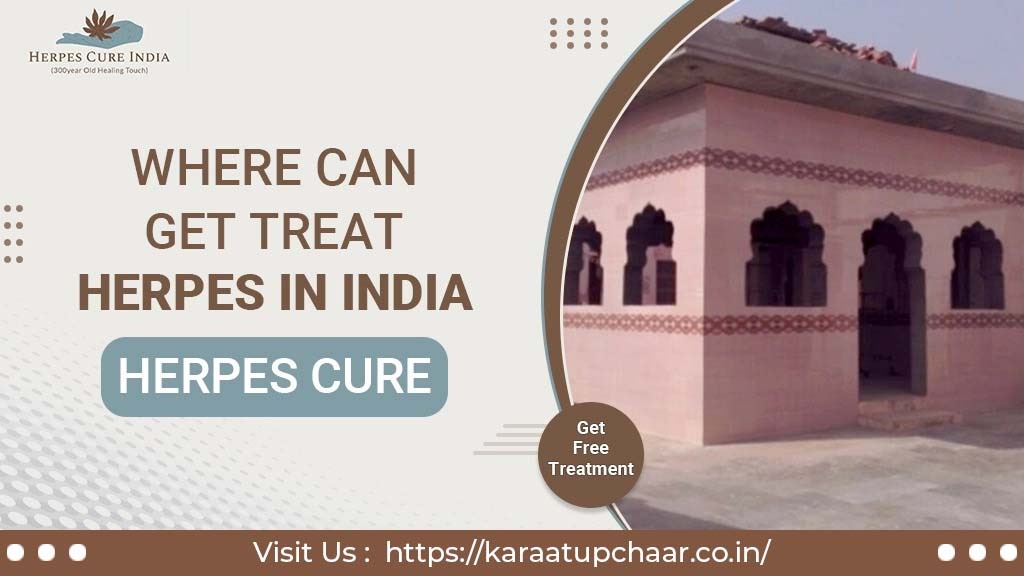
Where Can I Treat Herpes in India – Herpes Cure
How to Treat Herpes in India?
Herpes genitalis, also known as genital herpes, is a sexually transmitted disease caused by the herpes simplex virus (HSV). In India, we offer an amazing oil treatment that can help Treat Herpes in India, manage symptoms, and reduce the frequency and severity of outbreaks.
Our antiviral oils, including acyclovir, valacyclovir, and famciclovir, can help reduce the severity and duration of outbreaks. These oils not only help to treat Herpes in India but also reduce the risk of transmitting the virus to others.
What to Avoid During Treatment to Effectively Treat Herpes in India
When treating herpes genitalis, it’s crucial to avoid certain triggers that can worsen symptoms or cause outbreaks. To effectively Treat Herpes in India, avoid the following:
- Sexual Activity: Avoid sexual intercourse during a herpes outbreak, as it increases the risk of transmitting the virus to your partner.
- Stress: Stress weakens the immune system and can trigger outbreaks. Managing stress through exercise, meditation, and therapy is essential when you want to Treat Herpes in India.
- Alcohol and Drugs: Substance abuse can weaken the immune system, making it harder to manage herpes. It’s important to avoid these during treatment.
- Tight or Irritating Clothing: Wearing loose clothing, especially around the genital area, can help prevent outbreaks and ease symptoms during the treatment.
How to Treat Herpes on the Face in India
Many people are unaware of how to treat Herpes in India when it appears on the face. Often mistaken for heat rash or chickenpox, facial herpes is actually a different type of virus that spreads quickly. According to a recent World Health Organization report, two-thirds of people under the age of 50 have herpes simplex virus 1 (HSV-1), also known as oral herpes.
Treat Herpes in India effectively by recognizing it early and using appropriate treatments. Herpes simplex virus is one of the most common infections worldwide, and it can cause painful blisters or ulcers on the face. Despite the prevalence of HSV-1 and HSV-2, many people lack knowledge about how to Treat Herpes in India.
Important Facts to Know When You Treat Herpes in India
Nearly everyone has been exposed to herpes, and the number of people with genital herpes is increasing. HSV-1, which typically causes cold sores, is now more commonly transmitted through oral sex, leading to genital herpes.
You can Treat Herpes in India with various methods, but awareness and prevention are key. HSV-1 and HSV-2 can both be spread through skin-to-skin contact, even when no symptoms are present. This makes it important for sexually active individuals to get tested and understand how to Treat Herpes in India effectively.
Why It’s Crucial to Treat Herpes in India
Herpes is a virus that spreads through direct contact. In India, it’s important to treat Herpes because the virus can remain dormant and then reactivate, leading to outbreaks. Even if symptoms are mild, the virus can still be transmitted to others.
In particular, the relationship between HSV-2 and HIV highlights the importance of managing herpes. Those with compromised immune systems, such as people living with HIV, may experience more severe HSV symptoms. Using condoms and avoiding contact during outbreaks are essential strategies to Treat Herpes in India and prevent the spread of the virus.
How to Recognize and Treat Herpes in India
Most people with herpes don’t know they have it because they never develop symptoms. However, even without symptoms, the virus can still be transmitted. In India, most doctors won’t test for HSV unless symptoms are present, making it even more important to be proactive in managing and treating herpes.
Honesty with partners, using protection, and avoiding contact during outbreaks are effective ways to Treat Herpes in India and prevent its spread.
If you want to receive free herpes treatment from us, visit our website or contact us:
Call Us:
Raj Dulari (Hargovind Chahcha) – 9954064243
Manoj Agarwal / Sushil Agarwal (Son) – 9435115363 / 9435015362
Kamal Agarwal (Hargovind Chahcha) – 9013289821

Looking For Free Herpes Medication Treatment?
We have antiviral oils available that can be used as a herpes medication treatment for herpes outbreaks, reducing the severity and duration of symptoms. These medications include acyclovir, valacyclovir, and famciclovir. They work by stopping the virus from replicating and spreading in the body.
Antiviral herpes medications are usually prescribed by a healthcare provider, and the dosage and duration of treatment depend on the severity and frequency of the outbreaks. This herpes medication treatment can be taken orally as pills or administered intravenously in severe cases.
It’s important to note that while this herpes medication treatment can help manage herpes outbreaks, they do not cure the infection, and the virus can still be transmitted to others even when there are no visible symptoms. Therefore, it’s important to practice safe sex, take free herpes treatment from us, and follow preventive measures to reduce the risk of transmission.
The main goals of herpes medication treatment are to reduce discomfort, encourage rapid healing, and prevent complications. Early herpes medication treatment lowers the likelihood of post-herpetic neuralgia. Antiviral herpes medication is initiated within 72 hours of the appearance of the rash. Famciclovir has been demonstrated to work better than valacyclovir at easing the pain.
The confinement of the patient and the treatment of skin lesions are other elements of therapy. Patients must be confined to prevent nosocomial infections.
What are Side Effects of Herpes Medication?
These side effects are generally mild and go away on their own after a few days of treatment. However, if you experience any severe or persistent side effects, it’s important to contact your healthcare provider right away. It’s worth noting that some people may have an allergic reaction to herpes medication, which can cause symptoms like hives, difficulty breathing, or swelling of the face, lips, tongue, or throat. If you experience any of these symptoms after taking herpes cure medication in India, seek medical attention immediately.
The common side effects of herpes medication are given below:-
- – Nausea and vomiting
- – Diarrhea or constipation
- – Headache
- – Dizziness
- – Fatigue
- – Abdominal pain
- – Skin rash or itching
- – Hair loss
- – Reduced kidney function
Which antiviral agents does help in herpes medication treatment?
These are the main herpes medication agents treated with antiviral drugs:
– Valacyclovir
– Famciclovir
– Acyclovir
These herpes medications lessen discomfort, hasten healing, and shield against post-herpetic neuralgia. Antiviral herpes medication works within 72 hours of the appearance of the shingles rash. Famciclovir has been demonstrated to be more effective than valacyclovir at easing the pain associated with acute herpes zoster. Using a 7-day famciclovir regimen, the soreness started to fade after 34 days. According to a study, oral acyclovir and valacyclovir were not associated with a greater risk of acute renal impairment than famciclovir.
Role of Corticosteroids in herpes medication treatment
Corticosteroid therapy is recommended in exceptional cases like acute zoster pain, Ramsay Hunt syndrome, and ocular sequelae. Combining corticosteroid therapy with an antiviral herpes medication improves its effectiveness. The combination of acyclovir and corticosteroids has demonstrated excellent success in the treatment of herpes zoster in both adults and children. Early therapy also speeds up the recovery of hearing.
Acyclovir and prednisolone may help reduce the rash and other immediate symptoms of herpes zoster, but it is not clear if they will help prevent long-term pain from post-herpes cure treatment neuralgia.
When should be given Herpes medication treatment?
Initial Herpes Treatment:
When genital herpes is first detected, a doctor may prescribe an antiviral medication for a short period (seven to ten days) to treat any existing symptoms or prevent them from worsening. If the sores have not healed after that period, the doctor may decide to extend your treatment. Talk to your doctor about the best way to take antiviral drugs after the first treatment has ended.
Intermittent Herpes Treatment:
If the doctor recommends an antiviral medication for you to keep in your medicine cabinet, you are receiving intermittent treatment. As soon as you see sores or a probable eruption, you may take the pills for two to five days. The drugs may make the sores less painful and go away faster, but the healing and fading process will happen anyway.
Suppressive Herpes Treatment:
You have to take an antiviral medicine regularly if you encounter a recurrent herpes outbreak. Suppressive therapy is the phrase used by medical professionals. In those who have more than six outbreaks annually, suppressive medicine has the potential to reduce the frequency of outbreaks by 70% to 80%. People who take antiviral drugs regularly often say that they never feel sick from the virus they are treating.
Herpes medication Treatment during Pregnancy
Acyclovir or valacyclovir can be used to treat herpes zoster when a pregnant woman has genital Herpes Simplex Virus. Acyclovir is the drug of choice (DOC) in early pregnancy because it lowers the risk of birth defects and preterm birth before 37 weeks.
A 28-week pregnant woman treated for herpes zoster neuralgia with acyclovir and acetaminophen gave birth to a healthy child two months later. Valacyclovir was well tolerated by a 17-week pregnant woman with herpes zoster. Newborns whose mothers have varicella or herpes shingles should get varicella zoster immune globulin between 5 days before and 2 days after giving birth. Even if the mother has experienced these issues in the past, this is still true.
Frequently Asked Questions (FAQ) About Herpes
Can herpes kill you?
Herpes, caused by the herpes simplex virus (HSV), is generally not life-threatening in most cases. The two main types, HSV-1 and HSV-2, cause oral and genital herpes, respectively. While these infections can be painful and cause discomfort, they typically do not pose a serious health risk for otherwise healthy individuals.
However, in certain circumstances, herpes can become more severe. For instance, herpes encephalitis, an infection of the brain caused by HSV, is rare but can be life-threatening without prompt treatment. Additionally, individuals with weakened immune systems, such as those with HIV/AIDS or undergoing chemotherapy, may experience more severe complications from herpes infections. Pregnant women with active genital herpes also risk transmitting the virus to their newborn during childbirth, which can be serious for the infant. Despite these potential risks, with proper medical care and antiviral medications, herpes is generally manageable and rarely fatal.
Can herpes be cured?
Herpes cannot be cured, as it is caused by the herpes simplex virus (HSV), which remains in the body for life. However, antiviral medications like acyclovir, valacyclovir, and famciclovir can manage symptoms, reduce the frequency and severity of outbreaks, and lower the risk of transmission. These treatments help control the virus, but they do not eliminate it. Good hygiene practices and avoiding contact during outbreaks can also help manage and reduce the spread of herpes. Despite the lack of a cure, many people with herpes lead healthy and normal lives.
Are herpes dangerous?
Herpes is generally not dangerous for most healthy individuals, but it can cause significant discomfort and complications in certain situations. Oral herpes (HSV-1) and genital herpes (HSV-2) typically cause painful sores and blisters but are not life-threatening. However, herpes can be more serious for:
1. Newborns: Neonatal herpes, transmitted from mother to baby during childbirth, can be severe and even life-threatening.
2. Immunocompromised individuals: People with weakened immune systems, such as those with HIV/AIDS or undergoing chemotherapy, may experience more severe and frequent outbreaks.
3. Herpes encephalitis: A rare but serious brain infection caused by HSV, which can lead to significant neurological damage if not treated promptly.
While herpes can cause complications, antiviral medications and proper medical care can effectively manage the condition and reduce risks.
If you want to get free herpes treatment from us, then visit our website-
Call Us –
- Trinagar Kamal Agarwal (Hargovind Chahcha) – 9013289821
- FD 46, Pitampura Prachi Agarwal – 9811718621
- Ramprastha, Vaisali, Noida Ravi Agarwal – 9911395464
.
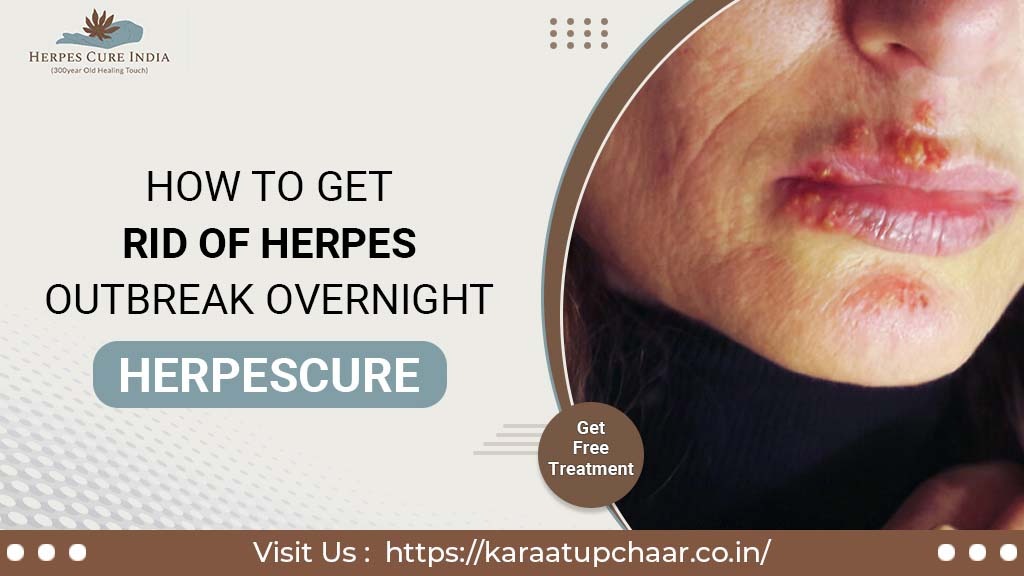
How to Get Rid of Herpes Outbreak Overnight
Unfortunately, getting rid of a herpes outbreak overnight is not possible, but with the help of antiviral drugs, you can reduce the symptoms within two to three days. Homeopathic remedies can also help treat the symptoms of a herpes outbreak by relieving discomfort, such as soothing aloe vera gel or lemon balm.
How to Get Rid of Herpes Outbreak: What You Need to Know
Herpes is an incurable virus that can only be managed by treating the symptoms and practicing self-care. Like most viral infections, herpes outbreaks take time to clear up. Herpes is considered a sexually transmitted infection (STI) and spreads through skin-to-skin contact with the affected area. It is most contagious during herpes outbreaks.
An outbreak can cause sores on or near the genitals or mouth, and touching these sores can spread the infection to others. These sores start out as itchy, painful, and intermittent blisters that can come and go.
Because outbreaks can last for a long time, herpes is highly contagious and uncomfortable. People often rush to resolve a herpes outbreak, hoping that those around them won’t notice. Unfortunately, the quickest way to get rid of Herpes is to consult with a doctor who can help you decide on the best treatment, whether it’s home remedies or antiviral medications.
Treating Herpes Symptoms: Options to Get Rid of Herpes Quickly
For treating herpes symptoms, especially if you have oral cold sores, over-the-counter creams such as Abreva or the antiviral drug penciclovir can be effective. However, it’s important to note that these treatments won’t completely get rid of Herpes but can help reduce the severity and duration of outbreaks.
Home Remedies to Get Rid of Herpes Symptoms
Home remedies, supplements, and lifestyle changes play a significant role in overall treatment of Herpes. Antiviral drugs can only do so much; maintaining overall health is key to effectively managing herpes.
A healthy diet designed to reduce herpes symptoms includes antioxidant-rich fruits and vegetables. Antioxidants help strengthen the immune system, prevent infection, and reduce inflammation that can trigger or worsen outbreaks. Foods such as spinach and blueberries are excellent sources of lysine, an amino acid that helps suppress herpes.
Omega Fatty Acids and Other Nutrients to Get Rid of Herpes Symptoms
Omega-3 fatty acids from salmon and flaxseed help fight inflammation and boost the immune system. Foods rich in vitamin C can speed up the healing of cold sores and increase the time between outbreaks. Colorful fruits and vegetables like peppers, mangoes, and oranges are rich in vitamin C and can help you get rid of Herpes symptoms faster.
While it’s best to get vitamins, minerals, and amino acids from food sources, dietary supplements can fill in potential gaps. A daily dose of zinc and lysine (an anti-herpes amino acid) supplements can help prevent breakouts, while vitamin B supplements can shorten the duration of an outbreak.
Certain foods and substances should be avoided if you want to get rid of Herpes more effectively. For example, the amino acid L-arginine, found in chocolate, can cause breakouts. Alcohol weakens the immune system, so it’s best to drink in moderation and avoid alcohol during outbreaks to speed healing. Highly acidic foods like lemons and beer can irritate open wounds and slow the healing process.
Final Words: How to Get Rid of Herpes Naturally
Foods high in added sugar, highly processed, or containing preservatives can affect how often herpes symptoms appear. Natural remedies can also help you get rid of Herpes symptoms. For example, heat compresses can relieve and heal herpes pain, while honey, a natural antibacterial agent, can be applied to wounds to help them heal and stay clean. Aloe vera gel, commonly used for sunburns, can relieve the pain and inflammation associated with herpes sores. Tea tree oil, a natural antibacterial agent, and witch hazel, a natural antiviral agent, can also be effective. However, these should be combined with ointments like Neosporin or petroleum jelly to avoid skin irritation.
If you want to get rid of Herpes quickly, Karaatupchaar is the best website for free and effective treatment. If you are tired of using too many medicines and ointments, Karaatupchaar offers a solution to help you overcome this problem. Karaatupchaar provides free and painless treatment across India. For further information, visit our website.
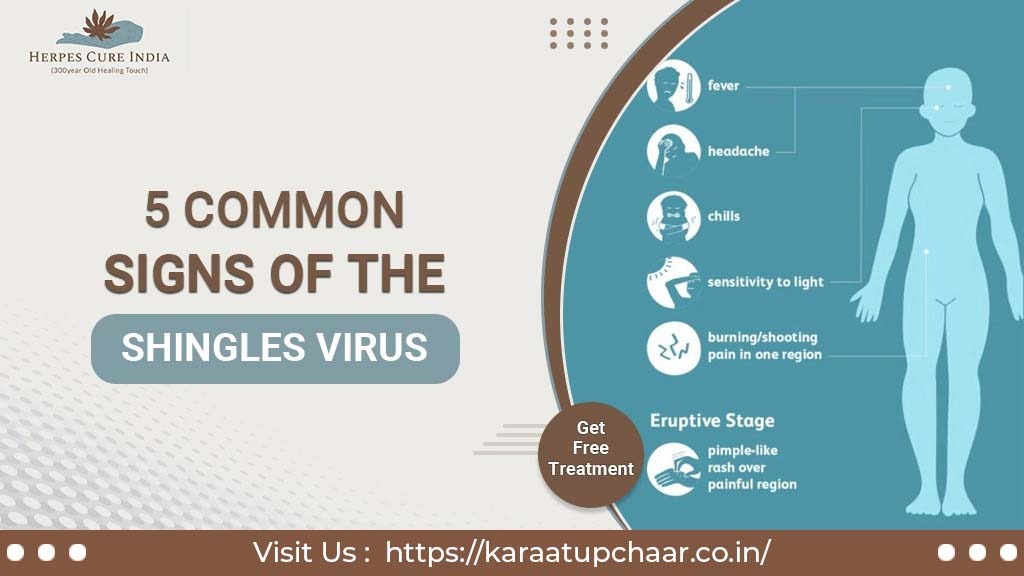
Herpes Shingles Rash: Know 5 Common Signs of the Shingles Virus
What is Shingles Rash? Understanding the Key Signs of Shingles Virus
Shingles Rash, also known as herpes zoster, is a painful skin condition caused by the varicella-zoster virus. It usually appears as a single stripe of blisters that wraps around one side of the body, but it can also develop on the face or other parts of the body. This shingles rash can cause severe pain and discomfort, as well as other symptoms such as fever and headache. It typically occurs in individuals who have had chickenpox in the past, as the virus remains dormant in the body and can reactivate later in life. Shingles affects nearly 1 million people in India each year. Recognizing the Signs of Shingles Virus is crucial for early treatment, which may include antiviral medications and pain management strategies.
How Can You Recognize the Signs of Shingles Virus?
The herpes shingles virus most commonly manifests as a shingles rash. Shingles is very similar to chickenpox, as both conditions are caused by the same virus. The rash typically consists of painful, fluid-filled blisters in a localized area of the body. This localization occurs because shingles affect specific nerve roots, and the rash most commonly appears on the chest, back, neck, and buttocks, where these nerve clusters are located. Recognizing these Signs of Shingles Virus early can help you seek appropriate treatment.
While the rash is the most apparent symptom of a herpes outbreak, it’s important to be aware that there are other significant Signs of Shingles Virus. Many patients report feeling generally unwell or experiencing flu-like symptoms in the days before the rash appears.
Numbness or Tingling: Early Signs of Shingles Virus
In addition to flu-like symptoms, many patients experience tingling or numbness before the shingles rash develops. These sensations typically occur in the same area of the body that is later affected by the rash.
These sensations can lead to extreme sensitivity to touch. Patients often report itching and burning sensations in the affected area. These symptoms are caused by the shingles virus infecting nerve roots, which respond to even minor stimuli. Patients may feel a burning or tingling sensation for no apparent reason, which are key Signs of Shingles Virus.
Nausea: A Common but Overlooked Sign of Shingles Virus
Nausea is one of the most common Signs of Shingles Virus. Many people experience nausea, especially when they eat or drink. Unfortunately, this symptom can escalate to a flu-like condition, though vomiting is relatively rare.
Instead, patients often experience severe stomach pain, diarrhea, and persistent nausea. Unlike the flu, nausea before a shingles outbreak is usually not accompanied by a fever. Recognizing this symptom early is crucial for starting herpes medication treatment as soon as possible.
Eye Complications: Critical Signs of Shingles Virus
Vision problems can occur when the shingles virus spreads to the nerves connected to the eyes. Patients may become extremely sensitive to light, which can be painful and is sometimes mistaken for migraine symptoms.
In more severe cases, the shingles virus can cause conjunctivitis (pink eye). When these signs of Shingles Virus occur, it is important to seek immediate medical attention. If left untreated, eye symptoms caused by shingles can lead to permanent vision problems. Although blindness from shingles is rare, it is still a possibility that should not be ignored.
Extreme Fatigue: One of the Early Signs of Shingles Virus
Extreme fatigue is another symptom often mistaken for the flu. Unexplained, intense fatigue frequently occurs in the days leading up to a shingles outbreak.
Unfortunately, many people respond to this symptom by increasing their caffeine intake, which only dehydrates the body and worsens fatigue. In rare cases, patients may experience confusion or even short-term memory loss during periods of extreme fatigue. Like the other Signs of Shingles Virus, severe fatigue should be treated by a doctor, regardless of whether the patient has the flu or not.
While Karaatupchaar offers free treatment for shingles rash, it’s important to pay attention to the Signs of Shingles Virus so that treatment can begin as soon as possible. Understanding these symptoms can help you take quick action.
If you’re concerned about a shingles rash and suspect it may be shingles, don’t hesitate to contact Herpes Cure today. Visit our website to book an appointment.
If you want to get free herpes treatment in India, visit our website or contact us:
Call Us:
Raj Dulari (Hargovind Chahcha) – 9954064243
Manoj Agarwal / Sushil Agarwal (Son) – 9435115363 / 9435015362
Kamal Agarwal (Hargovind Chahcha) – 9013289821

